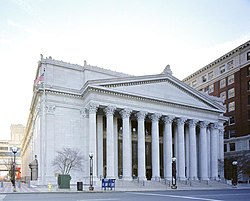| United States of America v. Aleksey Vladimirovich Ivanov | |
|---|---|
 | |
| Court | United States District Court for the District of Connecticut |
| Decided | December 6, 2001 |
| Case history | |
| Prior actions | Ivanov was indicted for charges of conspiracy, computer fraud, extortion, and possession of illegal access devices. Ivanov motioned to dismiss, arguing the court lacked subject-matter jurisdiction. |
| Subsequent action | Ivanov was sentenced to 48 months in prison in the United States. |
| Holding | |
| Ivanov's motion for dismissal was denied. | |
| Court membership | |
| Judge sitting | Alvin W. Thompson |
| Keywords | |
| Subject-matter jurisdiction Legal aspects of computing Cybercrime | |
United States v. Ivanov was an American court case addressing subject-matter jurisdiction for computer crimes performed by Internet users outside of the United States against American businesses and infrastructure. In trial court, Aleksey Vladimirovich Ivanov of Chelyabinsk, Russia was indicted for conspiracy, computer fraud, extortion, and possession of illegal access devices; all crimes committed against the Online Information Bureau (OIB) whose business and infrastructure were based in Vernon, Connecticut.
Contents
- Background
- Unlawful access and FBI capture
- Attack on OIB
- Trials
- Indictment
- Ivanov's appeal
- Subsequent rulings
- Impact
- References
- External links
Ivanov moved to dismiss the indictment, claiming that the court lacked subject-matter jurisdiction, arguing that "because he was physically located in Russia when the offenses were committed, he can not be charged with violations of United States law." [1] The court denied Ivanov's motion, "first, because the intended and actual detrimental effects of Ivanov's actions in Russia occurred within the United States, and second, because each of the statutes under which Ivanov was charged with a substantive offense was intended by Congress to apply extraterritorially." [1]
In a later ruling, Ivanov pleaded guilty to several crimes, including computer intrusion and computer fraud, and was sentenced to 48 months in prison followed by 3 months of supervised release. [2]